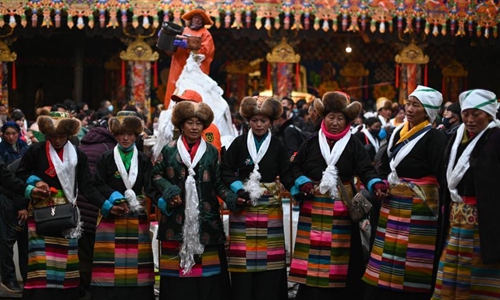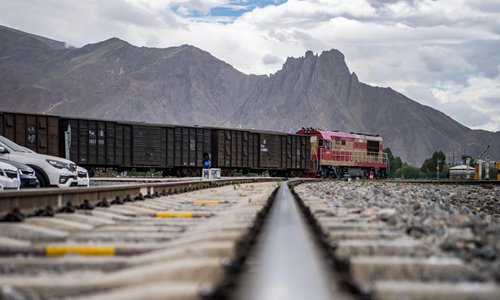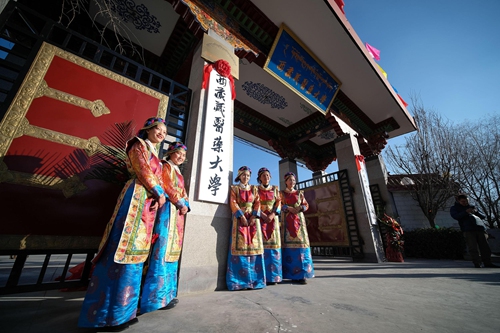HOME >> CHINA
US Tibet bill interference in China's internal affairs
By GT staff reporters Source:Global Times Published: 2020/1/29 22:57:09 Last Updated: 2020/1/30 23:49:14

Tibetan people celebrated their "Fairy Festival" on December 12, 2019 in southwest China's Tibet Autonomous Region. The Fairy Festival falls on October 15 every year according to the Tibetan calendar and involves various kinds of religious activities.(Photo: China News Service/He Penglei)
Chinese experts slammed the Tibetan bill that the US House of Representatives passed on Tuesday, which proposes sanctions on Chinese officials involved in the reincarnation of the Dalai Lama. They called the bill a gross interference in China's internal affairs under the guise of religious freedom which will not have any substantial influence on China.
The US House approved "The Tibet Policy and Support Act of 2019" Tuesday afternoon, which was introduced by Massachusetts Democrat Jim McGovern. The bill claimed the succession of the 14th Dalai Lama should be decided solely by spiritual leaders without the "interference" of the Chinese government, and should take into consideration the 14th Dalai Lama's "instruction."
Lian Xiangmin, an expert with the China Tibetology Research Center in Beijing , told the Global Times Wednesday that per Tibetan Buddhism history, from the Second Dalai Lama to the current 14th Dalai Lama, the process of the reincarnation of the Dalai Lama starts only after the death of the previous Dalai Lama. There cannot be any precedent of "instruction" and "designation" when the incumbent Dalai Lama is still alive.
"The US [House] passed the bill to regulate the process of the reincarnation when the 14th Dalai Lama is still alive. Is it urging the 14th Dalai Lama to die as soon as possible?" Lian questioned.
Lian said that based on the history and practices of Tibetan Buddhism, after the death of the Dalai Lama, the Gelug sect of Tibetan Buddhism and the Tibetan local government must report to the central government before they can start seeking and identifying the reincarnated soul boy.
Another scholar on religious affairs who requested anonymity told the Global Times Wednesday the reincarnation of the Dalai Lama has never solely been a religious issue, but also a political issue.
The scholar said the US' move is an attempt at invigorating the Tibetan separatist forces overseas, who are highly likely to hype the issue in the international stage.
The US' claim that the reincarnation should be made solely by leaders of faith does not hold water, he said.
The system of lot-drawing from a golden urn to confirm the reincarnated soul boy of a deceased Living Buddha established in history proves that the power to seek and approve the reincarnation is in the hands of the central government. The system also shows clearly that the Tibetan regional government is subordinate to the central government. The Eighth Dalai Lama emphasized the importance of the gold urn system in a written document, the scholar said.

A train arrives at the freight depot of the Lhasa West Railway Station in the capital of Southwest China’s Tibet Autonomous Region, on June 13, 2018. The freight depot is the largest in the region. Photo: VCG
Doomed to fail
The US bill also threatened sanctions, if Chinese officials "interfere" in the process of recognizing a successor or reincarnation of the Dalai Lama, under the Global Magnitsky Act. This may include visa sanctions and freezing of US assets of those sanctioned and suspension of business transactions between them and US citizens and companies.
Diao Daming, an associate professor at the Renmin University of China in Beijing, told the Global Times Wednesday that although this "long-arm jurisdiction" looks harsh, it actually has a limited impact on Chinese officials, given there is already a nationwide anti-corruption campaign and strict Party governance.
The bill also seeks the establishment of a US consulate in Lhasa. Diao pointed out that the US already has a consulate in Chengdu, capital of Southwest China’s Sichuan Province. According to the population distribution of Southwest China and the number of Americans in the region, the consulate in Chengdu is able to meet their needs of consular protection and services.
The real intention of the US to set up a consulate in Lhasa is to further strengthen ties between the US and China's Tibet to facilitate direct interference in Tibetan affairs, Diao said.
Republican Senator Marco Rubio of Florida has sponsored the Senate version of the legislation, which has not been tabled for a vote yet. The bill needs to pass the Senate before the US president formally signs it into law.

The Tibetan Traditional Medical University in Lhasa holds a renaming ceremony in 2018. Photo: VCG
Sun Hongnian, a researcher at the Institute of Chinese Borderland Studies, told the Global Times on Wednesday that this year is the US presidential election year and both parties want to win more votes, so it is very likely for the Senate to pass it and the president to sign it.
Sun pointed out that in the last two years the US has passed several acts related to China's Xinjiang, Taiwan and Hong Kong regions. It intends to use extreme pressure tactics while creating trade frictions with China, and use China’s internal affairs as leverage.
The US' intention is to shake China's stability and contain China's peaceful development, Sun said. He noted that the US' move is doomed to fail.
Sun said if the bill is passed in the US Senate, China can take countermeasures, such as reciprocal actions against relevant lawmakers who have proposed and supported the bill. China can stop issuing them visas, restricting or even freezing their personal and currently operating companies under Chinese jurisdictions, and prohibit their trade in China.
China firmly opposes the act, which severely violates the international laws and interferes in China's domestic affairs, spokesperson of Chinese Foreign Ministry Hua Chunying said Wednesday.
The bill sent wrong signals to Tibetan separatists. Tibet is an inalienable part of China and the Tibetan issues are China's domestic affairs leaving no space for outside interference, Hua said.
"People of all ethnic groups in Tibet sincerely uphold the Chinese central government and the regional government's policies and they are working together with people across the nation to build a moderately prosperous society," Hua noted.
Posted in: DIPLOMACY